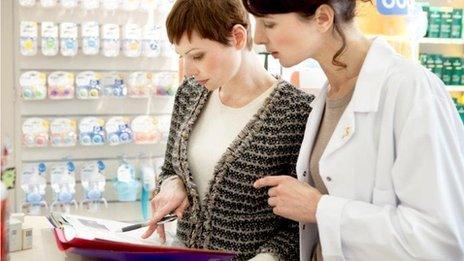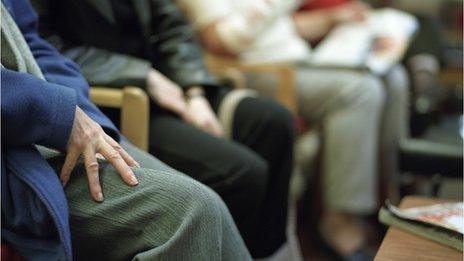Pharmacies 'could play greater role'
- Published
- comments

Pharmacies should be providing a wider range of health services because of their excellent reach into communities, researchers say.
A study by Durham University suggests 89% of England's population live within a 20-minute walk of a pharmacy.
In deprived areas, the proportion was nearly 100%.
The researchers said with more support pharmacies could provide everything from blood-pressure checks and diabetes screening to lifestyle advice.
Some pharmacies already do this, but researchers said it very much depended on whether local health bosses were willing to fund them.
Lead author Dr Adam Todd said: "These results show that pharmacies are well-placed in the community to deliver public health services.
"This is particularly important for the poorest areas where more people die from conditions such as smoking, alcohol misuse and obesity compared to people from more affluent areas.
"With easy access without patients needing to make an appointment, the results suggest there is a potential for community pharmacies to deliver public health interventions to areas which need it most."
'Huge potential'
The paper - published in the BMJ Open journal - said pharmacies could play a particularly vital role because the often-quoted inverse care law did not seem to apply.
That refers to the fact that the areas with the best health services tended to be the ones with the least health problems.
But as the deprived areas had the better access to pharmacies, the reverse was true, the study, which used a postcode analysis, said.
English Pharmacy Board chair Dr David Branford said the study demonstrated the "huge potential" the sector could have.
"The less formal approach and sheer convenience provided by a High Street presence means they are a beacon of wellbeing and advice to many who would simply never engage with other healthcare settings."
NHS England has already called for pharmacies to get more involved in delivering care with the review of urgent and emergency care last year suggesting up to a fifth of GP appointments could be dealt with by pharmacies or through better self-care.
A Department of Health spokeswoman said the number of pharmacies had increased by nearly 2,000 since 2005 to 11,500.
"Community pharmacies are an integral part of the NHS," she added.
- Published15 January 2014
- Published13 November 2013
